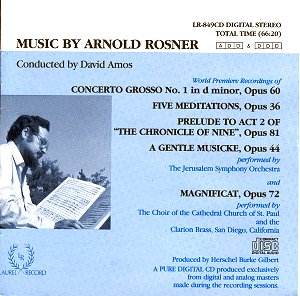Arnold ROSNER (b. 1945)
Concerto Grosso No. 1 (1974)
Five Meditations for cor anglais, harp and strings (1967)
Prelude to Act 2 - The Chronicle of Nine for full orchestra
(1984)
A Gentle Musicke for flute and strings (1969)
Magnificat for mixed chorus, solo tenor and alto, two trumpets,
two trombones (1979)
 rec. all works except
Magnificat: Jerusalem SO/David Amos; Nahum Zaidel (flute) in Gentle
Musicke; Mina Seidman-Haas (cor anglais); Irena Kessler (harp) in
Meditations.
rec. all works except
Magnificat: Jerusalem SO/David Amos; Nahum Zaidel (flute) in Gentle
Musicke; Mina Seidman-Haas (cor anglais); Irena Kessler (harp) in
Meditations.
rec. Magnificat: Choir of Cathedral Church of St Paul/Clarion Brass,
San Diego
all ADD except Magnificat - DDD
all world premiere recordings
 LAUREL RECORD LR-849-CD
[66.20]
LAUREL RECORD LR-849-CD
[66.20]

The Concerto Grosso has a determined and busy ambience; a shade academic
sometimes and at others rather grandly neo-baroque. The almost desperately
serious string writing recalls
Martinö at his most glum
and stressed as in the Concerto for Double String Orchestra, Piano and Timpani.
That severity rolls forward into the aria. The work is scored for
strings, pairs of flutes, oboes, bassoons, horns and trumpets. It is almost
Vaughan Williamsy with great imagination at play - e.g. the moment when,
at 4.40 of the second movement, the clamorous brass falls away leaving a
serene bed of high quiet strings. The composer calls this technique "leftovers";
and points out that one finds it also in Panufnik (Sinfonia Sacra)
and Prokofiev (Romeo and Juliet) and others. A jazzy rhythmically
disrupted Toccata dances away in 5/8 most of the way, with a 5/4
augmentation as climax: part Tippett - part scorching Stravinsky.
The Magnificat breaks from tradition in presenting the canticles as
a single unbroken sequence of music. There is contrast but this is accommodated
within continuity. This is a work of comparative severity accentuated by
the gaunt Schütz-like brass voicing.
The Five Meditations and A Gentle Musicke would very aptly
partner Rubbra's Farnaby Improvisations, Warlock's Capriol and
Moeran's Serenade or at least their less rowdy movements. The two
works have the feel of 'antiquitie' mingled, in Air (Meditations),
with devout religious atmosphere similar to that in Rózsa's Biblical
film scores. Devotions may not be far from the mark for the composer, in
his liner notes, hints at a connection with the five parts of the Mass. Indeed
his Fifth Symphony is a direct Mass-analogue. He has written three a cappella
masses: Missa Greensleeves, Missa l'Homme Armé and
Missa In Nomine, all between 1967 and 1974.
Rosner was occupied with writing the three act opera The Chronicle of
Nine between 1981 and 1984. This is based on the tragic story of Lady
Jane Grey. The second act prelude serves as the final part of a four movement
suite of orchestral music from the opera. I would have liked to have heard
the other movements. As it is, the Prelude, in all its funereal and wrenching
majesty, registers very strongly. As a crude stylistic analogue think of
a fusion of Vaughan Williams 5, Purcell's funeral music, Stokowski's
orchestration of the Toccata and Fugue in D minor and the searing Fifth Symphony
of William Alwyn. This is music whose substance is on a grand scale evoking
the remorseless sweep of great events treading down and mangling the lives
of complicit and innocent alike. Extremely impressive - weeping caustic tears.
I count the Chronicle of Nine prelude a major discovery and urge you
to hear it. There is now a small list of operas which we must hear: Will
Todd's Isambard Kingdom Brunel, Rutland Boughton's Queen of
Cornwall, Inglis Gundry's Galileo and now Arnold Rosner's
Chronicle of Nine.
I am grateful to Walter Simmons for confirming that the whole opera has not
been performed, but that the orchestral suite, called "Tragedy of Queen Jane"
(of which the Prelude/Dirge is one movement) will be on a forthcoming orchestral
CD.
Arnold Rosner is an imposing presence and it is imperative that his opera
The Chronicle of Nine is performed complete. Meantime there are two
other all-Rosner CDs in the pipeline: one orchestral, the other chamber.
As yet we have no date for issue nor a firm indication of which company will
be issuing them. I am hoping to review in due course five other CDs on each
of which there is at least one Rosner work among an anthology.
Rob Barnett
ORDERING DETAILS
This CD can be ordered from Laurel at:-
Laurel Record
2451 Nichols Canyon
Los Angeles
California 90046-1798
Phone - (213) 876-6040
Fax - (213) 876-6041

